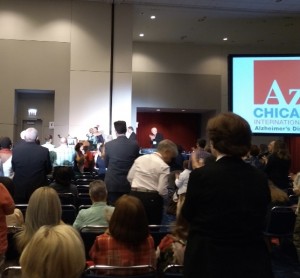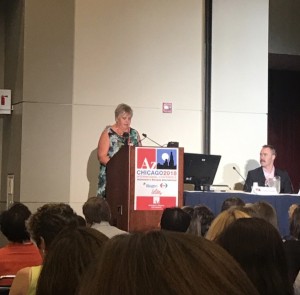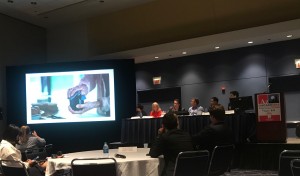Alzheimer’s Disease International’s (ADI) 33rd Conference, Chicago, USA
More than 600 delegates from approximately 100 countries gathered in Chicago on 26-29 July 2018, in order to participate in the longest running international conference on dementia.
ADI held their first Innovation Showcase signalling a unique approach to technology as a support for the everyday lives of people living with dementia. Perhaps technology holds some answers, and many more questions…
Do you trust research?
Following a lively opening ceremony with a local Blues band, the conference began with Professor Serge Gauthier’s session on participation in observational and therapeutic research to prevent dementia, using spinal taps and brain scans. Such medical research appeared worlds away from psychosocial research and the everyday experiences of people living with dementia but this was no traditional presentation. In fact, the crux of the session was a questionnaire in which attendees were asked to rank their trust in researchers before and after the session. This sparked lively debate from attendees sharing personal experiences of participating in research and set the tone for what was to be a participatory conference.
From spinal taps to stigma
Christine Thelker, a member of Dementia Alliance International, presented her experiences pre- and post-diagnosis of dementia. Having worked in healthcare and now living with dementia, Thelker shared an uncensored view of the stigmatisation of the diagnosis process. Thelker’s rallying call for an honest yet hopeful approach to dementia diagnosis, including signposting to post-diagnostic online and offline support was met with a standing ovation.
Each day featured sessions devoted to dementia policy-making. ADI is synonymous with its communication of policy and statistics on global and regional incidences of dementia, which form the bedrock of much dementia advocacy. Highlights included Jerry Wylie’s account of the reality of living with dementia according to such policies. Wylie called for a renewed focus on the human rights of people living with dementia.
Innovation showcase
Chicago proved to be an ideal setting for an innovation showcase as the city that gave birth to the first skyscraper in 1885, a previously inconceivable concept that changed the way people live. There was however a shift away from hi-tech solutions towards a pragmatic, everyday approach. The Nordic Innovation and Solutions in Dementia panel facilitated by Ludvig Mörnesten (Swedish Care International) underlined a need to balance data-driven remote diagnostic approaches offered by Haza Newman (Geras Solutions) with the everyday practicalities of ergonomic designs for people with dementia, which ultimately improves design and livability for all (Britt Monti, IKEA).
INDUCT – the Interdisciplinary Network for Dementia Using Current Technology shared a psychosocial perspective on the role of technology as an aid or barrier to participation in the lives of people with dementia, through oral presentations by Hannah Christie and Sophie Gaber, and poster presentations by Sara Bartels and Kate Shiells. Alieske Dam (Maastricht University) offered further insight into opportunities for technology to support the caregiver social network of people with dementia. The conference closed on a hopeful note with Professor Myrra Vernooij-Dassen highlighting the potential of psychosocial research to stimulate social health as a means of restoring capabilities of the person living with dementia.
Sophie Gaber (Karolinska Institutet, INDUCT ESR3): @evrydaytechgirl






